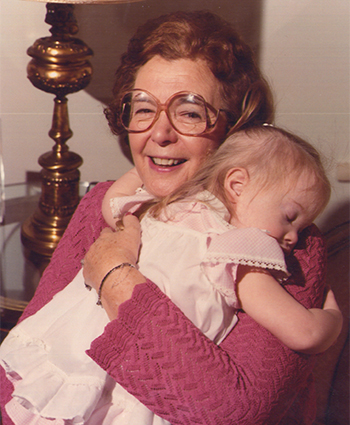Cause for Sainthood

Throughout a lifetime of service, Dr. Gertrude A. Barber knew many titles: administrator, leader, innovator. But the title that always seemed to fit her best was simply "teacher." In that role, Dr. Barber not only expanded the horizons of hundreds — if not thousands — of children, but also taught a community and even a nation how to ensure better, more enriching lives for individuals with disabilities. Through her example and her leadership, she transformed a system. But even more significantly, she changed attitudes about people with disabilities.
A devout Catholic, Dr. Barber's faith was a prism through which she saw the world. The philosophy for the organization that she founded begins: "all persons are children of God." To her, this was the basis for all of her work that began and expanded community-based services for children and adults with disabilities. She also saw this mission as a way for all of society to become closer to God through service to others. As she often said in encouraging others to support her work, "if you want to get to heaven someday you'd better get on board!"
In the years following her death, family, friends, and supporters worked to carry on her legacy through the work of what is now the Barber National Institute. While the organization has continued to grow to meet new and emerging needs, the more than 3,000 employees now serving more than 6,300 children and adults and their families continue to draw inspiration from the dedication and vision of its founder.
A group of those who knew Dr. Barber formally appealed to Bishop Lawrence Persico of the Diocese of Erie to begin the cause for canonization.
Testimonial
Dr. Barber was always there to compassionately guide families through the darkest hours. She guided us through trying times and brought us to a much higher level by allowing us to find some reason for our experience, and then to put it to good use in assisting others. Dr. Barber ... delivered every individual she encountered to a place that can only be described as their personal best.
Gertrude was a beautiful lady, but her outward beauty was a reflection of her inward refinement and peace knowing that she was doing God's work. Everyone who came in contact with her knew how special they were, for she had that ability to make each of us feel so special.
Dr. Barber gave you a different perspective on people with disabilities. She called them 'abilities' and so it just really had a positive spin on everything. It really gave you hope, and that's what most parents really needed.
Dr. Barber was the Mother Teresa of Erie. She saw the suffering of the exceptional children and adults of this area and used her manifest skills and above all, her love, to respond. With indomitable faith in God, Dr. Gertrude was a pioneer in service to those beloved by Christ. She left a thriving institution to carry on the work of service, education, and love that will always reflect the ideals of this humble, resourceful and noble woman. She has enriched our world.
As a loving and caring individual, a highly respected and admired professional, and a concerned civic leader, Gertrude delicately touched the souls of many and left behind a precious imprint of herself on families, friends, and her community.
We were her family; our children were her children, and we could pretty much talk to her about anything. I think part of what Dr. Barber was doing came from her instincts as a woman to make sure that children – all children – had the same benefits in the community. She's left a legacy of memories and has left a true and lasting effect.
She had a huge impact on the community; she got people to accept people who were different … Gertrude created something really special and unique and if you go across the United States, you'll have a hard time finding an organization like the Barber Center.

